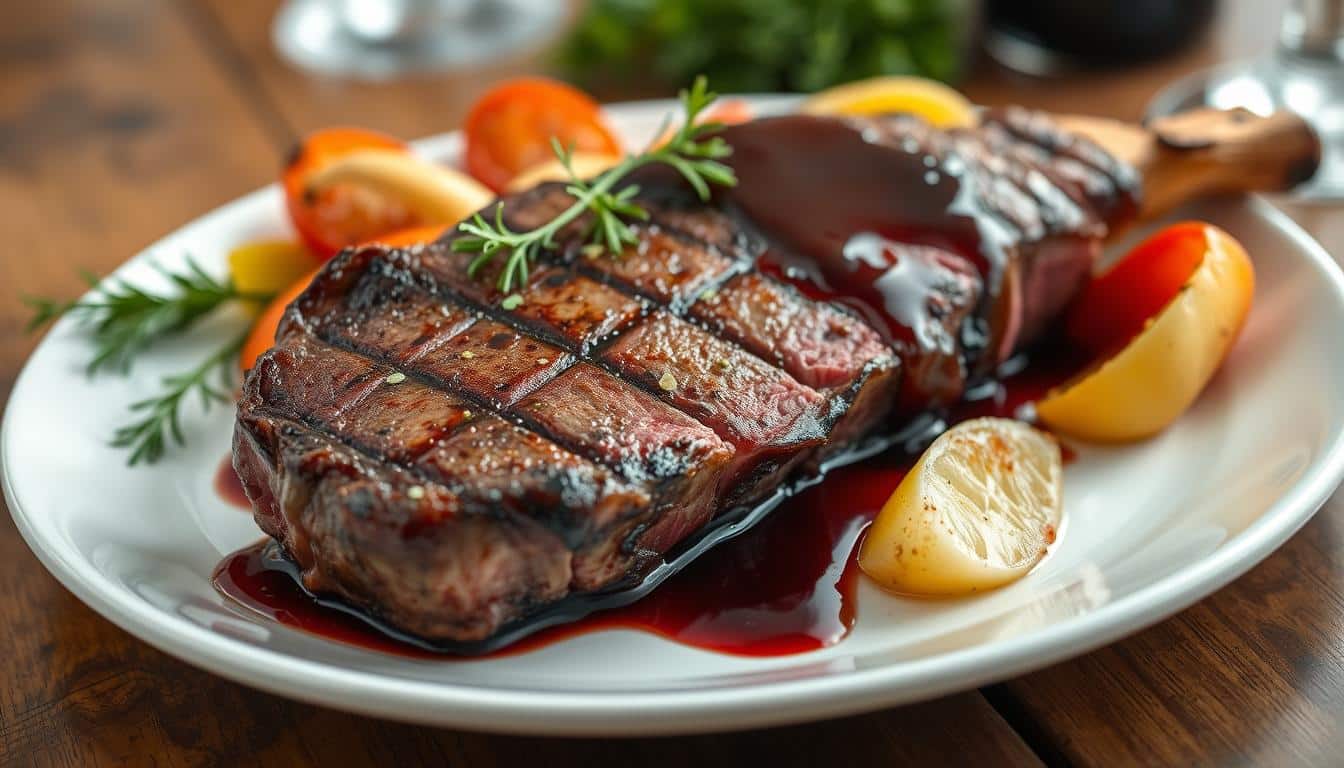We’re on a journey to find the best steak in America. We’ll explore sizzling grills and elegant dining rooms. Our quest is to find the prime cuts and flavors that make American steakhouses great.
We’ll visit famous places where chefs make steaks tender. They use special beef and aging methods. This makes the steak truly special.
Join us as we travel across the country. We’ll try the best steaks at famous and hidden spots. Get ready to learn where to find the best steaks in the USA today.
Understanding Prime Cuts and Their Characteristics
Steak quality is key. We’ll dive into prime cuts, USDA grades, and how marbling impacts taste and tenderness. This info will guide you in picking the best steak for your next meal.
USDA Prime vs Choice vs Select Grades
USDA grades show steak quality. Prime is the top, with lots of marbling and tender meat. Choice has good marbling and taste. Select has less marbling but is affordable.
| USDA Grade | Marbling | Tenderness | Flavor |
|---|---|---|---|
| Prime | Abundant | Excellent | Rich |
| Choice | Moderate | Very Good | Flavorful |
| Select | Slight | Good | Mild |
Marbling Patterns and Their Impact on Flavor
Marbling is the fat in meat. More marbling means richer flavor. This fat makes the meat juicy and tender. Prime cuts have the most marbling, leading to better taste and texture.
Most Popular Steak Cuts in American Restaurants
American steakhouses serve many prime cuts. Ribeye is loved for its flavor and marbling. Filet mignon is tender. New York strip balances flavor and texture. T-bone and porterhouse offer two cuts in one.
- Ribeye: Rich flavor, generous marbling
- Filet Mignon: Extremely tender
- New York Strip: Balanced flavor and texture
- T-bone/Porterhouse: Two cuts in one
Knowing these traits helps you choose the right steak. This ensures a great dining experience.
The Art of Dry-Aging: America’s Premium Steakhouses
Dry-aged beef is a culinary masterpiece. It turns good steak into an extraordinary experience. Premium steakhouses across America have mastered this art.
The process involves hanging beef in a controlled environment for weeks or months. Moisture evaporates, concentrating the taste. Natural enzymes break down muscle fibers, making the steak incredibly tender.
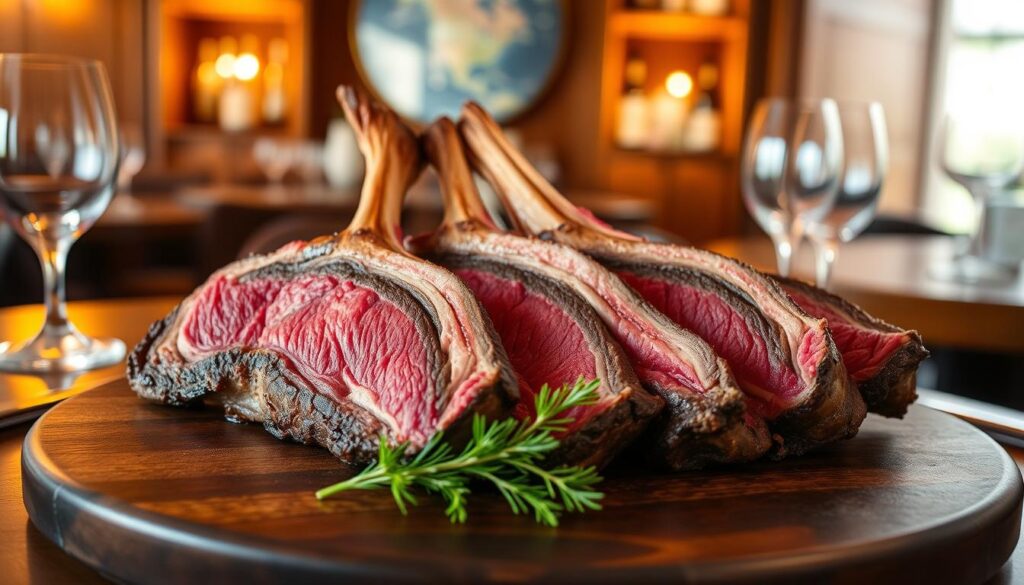
Top steakhouses in the US are proud of their dry-aging techniques. Peter Luger in New York is famous for its 28-day aged porterhouse. Bern’s Steakhouse in Tampa has an impressive aging room with cuts aged up to 60 days.
“Dry-aging beef is like aging fine wine. It develops complex flavors that simply can’t be replicated any other way.”
The flavor of dry-aged beef is unique. It’s often described as nutty, earthy, and intensely beefy. This depth of flavor is why dry-aged steaks are so expensive at high-end restaurants.
| Steakhouse | Location | Signature Dry-Aged Cut | Aging Period |
|---|---|---|---|
| Peter Luger | New York | Porterhouse | 28 days |
| Bern’s Steakhouse | Tampa | Delmonico | Up to 60 days |
| CUT by Wolfgang Puck | Las Vegas | Ribeye | 35 days |
| Bavette’s | Chicago | Bone-in Ribeye | 42 days |
We encourage steak lovers to try these premium steakhouses. Savor the unique taste of expertly dry-aged beef. It’s a true showcase of American steakhouse tradition.
Best Steak Destinations Across Major U.S. Cities
We’ve searched the country for top steak spots. These places offer great dining and stick to steakhouse traditions. You’ll find famous spots and hidden treasures that will make your taste buds happy.
New York’s Iconic Steakhouses
New York City is home to some of the world’s best steakhouses. Keens Steakhouse, opened in 1885, is famous for its mutton chops and whiskey. Peter Luger Steak House in Brooklyn has been serving top-notch porterhouse steaks for over 130 years.
Chicago’s Meat-Loving Culture
Chicago loves beef, and it shows in its steakhouses. Gibson’s Bar & Steakhouse is a favorite, with USDA Prime Angus beef aged 40 days. The Chicago Cut Steakhouse offers a modern take, with views of the Chicago River.
Las Vegas Premium Dining Experiences
Las Vegas offers fancy steak experiences. SW Steakhouse at Wynn Las Vegas has a fancy setting and great beef. CUT by Wolfgang Puck at The Palazzo has a wide range of beef, including Japanese Wagyu.
Texas Steakhouse Traditions
Texas is proud of its steak traditions. Pappas Bros. Steakhouse in Dallas is known for its wine and dry-aged beef. ALC Steaks in Austin has been around for 30 years, serving top-quality cuts in a cozy setting.
| City | Notable Steakhouse | Signature Dish |
|---|---|---|
| New York | Keens Steakhouse | Mutton Chops |
| Chicago | Gibson’s Bar & Steakhouse | 42 oz. Porterhouse |
| Las Vegas | SW Steakhouse | Chile-Rubbed Double Rib Eye |
| Dallas | Pappas Bros. Steakhouse | Bone-In Prime Ribeye |
American Wagyu: Where to Find Premium Domestic Breeds
American Wagyu beef has become very popular. It mixes Japanese genetics with American cattle. This results in meat with great marbling and flavor. We’ve found the best ranches and restaurants for this luxury meat.
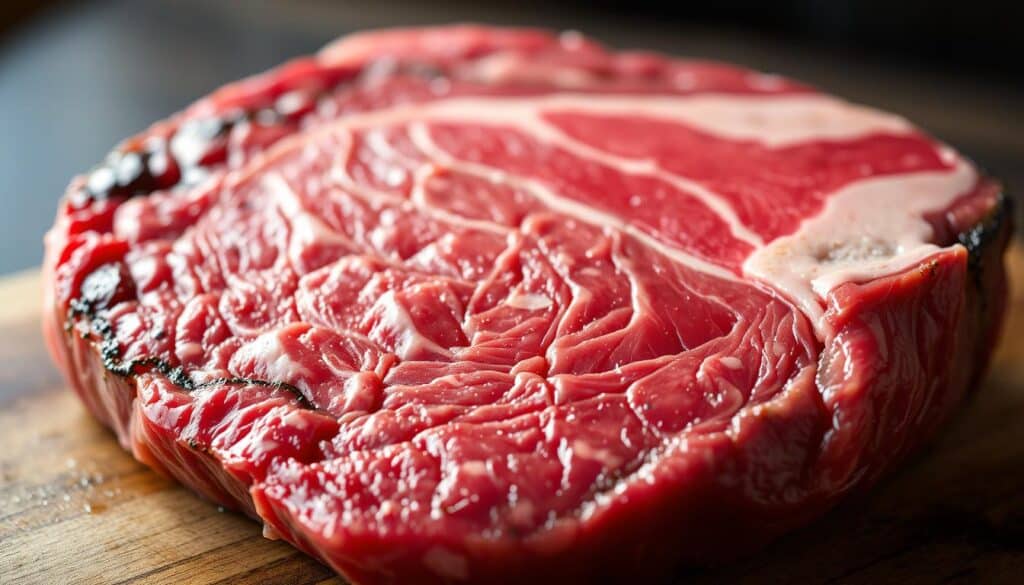
Snake River Farms is a top producer of American Wagyu. Their cattle are raised in the Northwest. They produce beef with lots of marbling and a buttery texture. Imperial Wagyu Beef is also known for its traditional Japanese breeding methods.
High-end steakhouses across the country now serve American Wagyu. In New York, Cut by Wolfgang Puck offers many Wagyu cuts. Chicago’s RPM Steak has a tasting flight of different Wagyu breeds.
| Ranch | Location | Signature Cut |
|---|---|---|
| Snake River Farms | Idaho | Gold Grade Ribeye |
| Imperial Wagyu Beef | Nebraska | Flat Iron Steak |
| Mishima Reserve | Washington | Tenderloin |
American Wagyu doesn’t have as much marbling as Japanese Wagyu. But it’s tender and has a beefy flavor. It’s a great choice for a premium steak with an American twist.
Grass-Fed Revolution: Top Farm-to-Table Steakhouses
The grass-fed cattle movement is sweeping across America. Farm-to-table steakhouses are leading the way with sustainable ranching. They offer more than just food; they give us an experience that cares for the planet and our taste buds.
Sustainable Ranching Practices
Sustainable ranching is key to the grass-fed movement. Ranchers use methods that help the land and animals. They move the cattle to different spots to let the grass grow back.
This way, the soil stays healthy, erosion is less, and more animals can live there.
Health Benefits of Grass-Fed Beef
Grass-fed beef is good for us and the earth. It’s leaner and full of nutrients. It has omega-3s, vitamins A and E, and antioxidants.
These help our hearts and boost our immune system.
Leading Sustainable Steakhouses
Farm-to-table steakhouses are everywhere. In Los Angeles, Gwen has a butcher shop and a restaurant. They buy from local ranches that care for the land.
On the East Coast, Blue Hill at Stone Barns in New York is a leader. They grow their own food and raise animals. This gives diners a real taste of sustainable eating.
“Our goal is to connect diners with the land that feeds them. We believe that by supporting sustainable ranching, we’re not just serving better food – we’re helping to build a better food system.”
The grass-fed movement is more than a trend. It’s a push for better food, health, and a greener future. By eating at these steakhouses, we support a vision for a better food world.
Hidden Gems: Lesser-Known Steakhouse Treasures
Big-name steakhouses get a lot of attention. But America’s hidden gems offer amazing steak experiences. We’ve found these lesser-known spots with delicious cuts and unique settings.
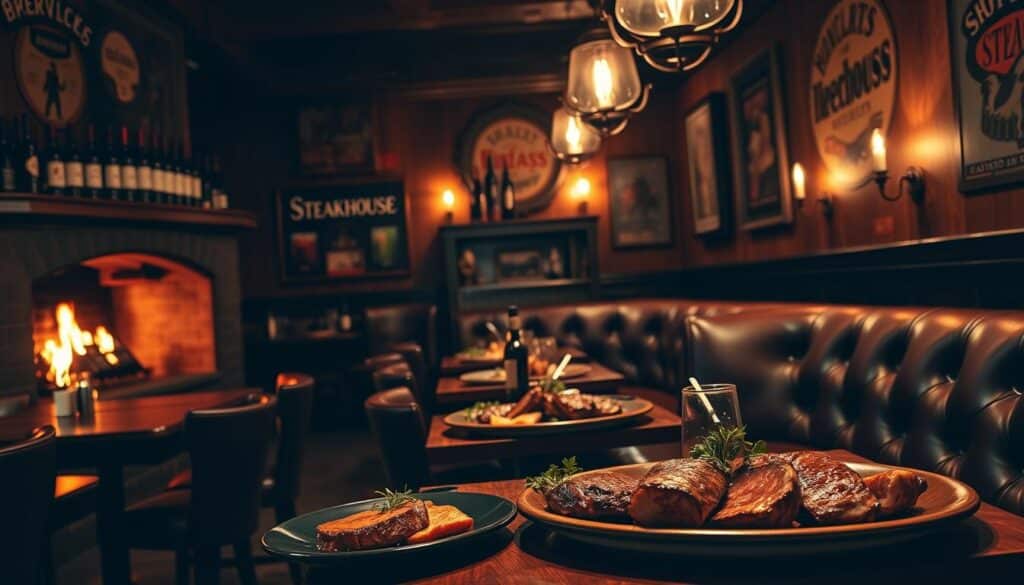
In Oklahoma City, Cattlemen’s Steakhouse is a classic. It’s been serving top-quality steaks for over a century. Try the lamb fries for a special treat.
In Greenville, Mississippi, Doe’s Eat Place is a hidden gem. It looks simple but serves huge, tasty steaks. The cozy feel makes it even better.
Bern’s Steak House in Tampa, Florida, is a mix of history and taste. It has a huge wine cellar and grows its own food. Their steaks are dry-aged and full of flavor.
“Sometimes the best steak isn’t found in a fancy restaurant, but in a place with character and history.”
These hidden spots show that great steaks are often found off the main path. Exploring these gems lets you try new flavors and make unforgettable meals.
Innovative Cooking Techniques in Modern Steakhouses
Modern steakhouses are changing grilling to make flavors better and steaks softer. They use new ways to make eating steak even better.
Wood-Fired and Specialty Grills
Wood-fired grills add smoky tastes to steaks, making them more complex. Places like Bazaar Meat in Las Vegas use special grills. They give steaks unique flavors.
Temperature Control Methods
Getting the steak just right is key. Sous-vide cooking and then searing it hot is popular. It makes sure the steak is cooked evenly and juicy.
Signature Preparation Styles
Steakhouses are creating their own special ways to cook. Cote in New York mixes Korean barbecue with American steakhouse. It offers a unique dining experience.
| Cooking Method | Effect on Flavor Profile | Impact on Tenderness |
|---|---|---|
| Wood-Fired Grill | Smoky, robust | Slight chew, caramelized exterior |
| Sous-Vide + Sear | Rich, concentrated | Extremely tender, consistent |
| Infrared Broiling | Intense, charred | Crisp crust, juicy interior |
These new grilling methods are changing the steakhouse scene. They offer a great mix of taste and tenderness. From wood-fired grills to exact temperature control, modern steakhouses are exploring new culinary paths.
Price Points: From Affordable to Ultra-Luxury Experiences
Steakhouse dining offers many price options. You can find something for every budget and occasion. From cheap chains to fancy places, all serve tasty beef.
At the low end, places like Steak ‘n Shake have tasty burgers and steaks at good prices. Mid-range spots like Outback Steakhouse offer quality steaks without high costs.
For the best steak, high-end steakhouses provide top-quality meats and service. They have dry-aged beef, rare cuts, and expert cooking.
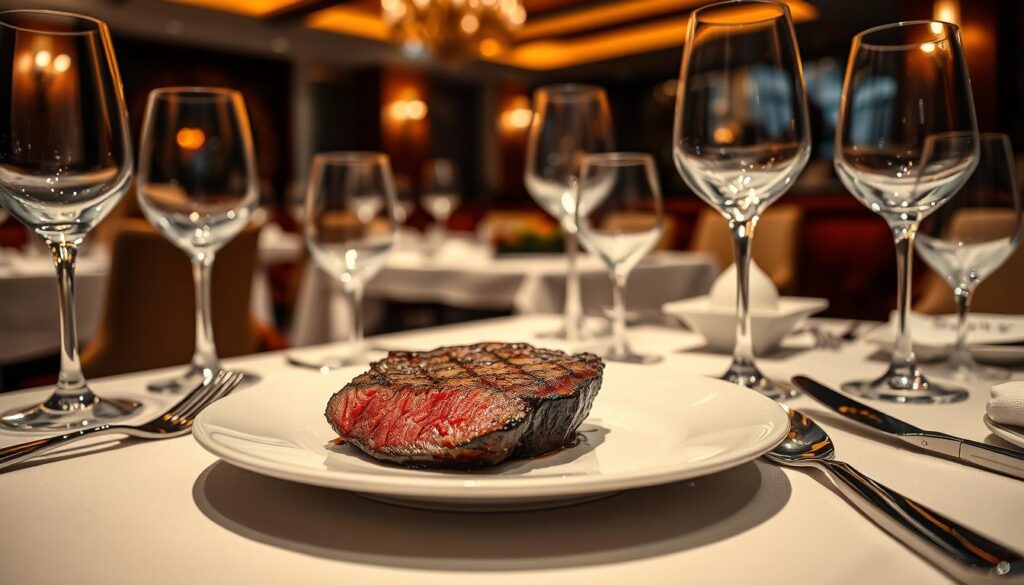
| Price Range | Average Entree Cost | Typical Offerings | Atmosphere |
|---|---|---|---|
| Budget-Friendly | $10 – $20 | Basic cuts, burgers | Casual, family-oriented |
| Mid-Range | $20 – $40 | Popular cuts, some prime options | Casual-upscale, date night |
| High-End | $40 – $100+ | Prime cuts, specialty breeds | Elegant, fine dining |
| Ultra-Luxury | $100 – $300+ | Rare cuts, wagyu, extensive wine lists | Exclusive, gourmet experience |
Remember, price doesn’t always mean quality. Some hidden gems offer great value. Others focus on unique dining experiences worth the extra cost.
Expert Tips for Ordering the Perfect Steak
Ordering a steak can be tricky, but with our expert tips, you’ll savor every bite. Top chefs share advice to help you choose the ideal cut and enjoy it to the fullest.
Understanding Doneness Levels
Knowing your preferred doneness is key to a satisfying steak experience. Here’s a quick guide:
- Rare: Cool red center
- Medium-rare: Warm red center
- Medium: Pink throughout
- Medium-well: Slight pink center
- Well-done: No pink
Remember, grilling techniques vary. So, communicate your preference clearly to ensure the perfect cook.
Pairing Recommendations
Enhance your steak’s flavor profile with the right pairings. Bold red wines like Cabernet Sauvignon or Malbec complement rich, fatty cuts. For sides, consider classics like crispy potatoes or grilled vegetables to balance the meal.
Seasonal Considerations
Steak seasonings can elevate your dining experience. In summer, opt for lighter herbs like rosemary or thyme. Winter calls for robust flavors such as peppercorn or garlic. Ask your server about seasonal specials that highlight unique flavor combinations.
“The right seasoning can transform a good steak into an unforgettable meal,” says Chef Maria Rodriguez, stressing the importance of complementary flavors.
By following these tips, you’ll order steak like a pro and enjoy a truly memorable dining experience.
Conclusion
Our journey through America’s best steak places shows a wide range of flavors and experiences. From New York’s famous steakhouses to Texas’s beef traditions, there’s much to try. Each place has its own special way of making this classic American dish.
The best steak isn’t just about the cut or grade. It’s about the meat quality, the chef’s skill, and the dining experience. You can find juicy ribeyes or lean filet mignons to suit any taste. American Wagyu and grass-fed options offer new flavors and health benefits.
Our meaty adventure shows that finding the best steak in America is a never-ending quest. Steakhouses keep improving with new cooking methods, sustainable practices, and top ingredients. Whether it’s a fancy place or a local secret, the perfect steak is out there for those who explore.

